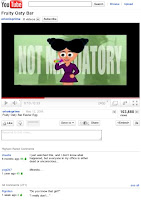Those of you who have forums on your Web site understand that spammers and trolls can be a real nuisance. Perhaps you can relate to the trouble Activision Blizzard has with dealing with the multitude of undesirable posts on their official World of Warcraft forums.
On July 6th, Activision Blizzard, Inc. unveiled a controversial plan to help regulate the forums: Anyone posting on forums would have their real name displayed. The philosophy is that with real names associated with each posting, personal accountability will come into play and subscribers will be more civil. There was immediate backlash from WOW subscribers and users concerned about this proposed policy change. Personal privacy advocates were particularly concerned about publicly displaying real names in connection with Warcraft. Posters also worried about the possibility of cyberstalking and out-of-game harassment.
In an attempt to show how "harmless" the proposed change would be, a forum moderator posted his real name in the Blizzard Forum discussion on this topic.
 Within minutes, community members posted all matter of personal information on him. Using only Google searches and his real name, they found and posted such info as his:
Within minutes, community members posted all matter of personal information on him. Using only Google searches and his real name, they found and posted such info as his:
- Cell phone number
- Twitter and Facebook accounts
- Personal photos
- Mailing address
- Maps to his house.
The community used this opportunity to illustrate how much information can be easily gathered, and how it could be dangerous when your real name is displayed in the forums.

There are simpler ways to combat undesirable posters than by publicly displaying personally identifying information. In her post, forum moderator Nethaera provides the basic methods used in forums to ensure that useful information will be seen and found by users:
- Having the community rate posts (the Slashdot commenting model)
- Highlighting posts based on rating (YouTube's "highest rated comment" model)
- Improving forum search
YouTube has successfully adopted most of these methods to improve the comments on their videos (highest rated comments, voting up/voting down and automatically hiding spam/comments with a low rating). 
The lesson is that spammers and trolls will make it on to your company forums, as they find their way onto EVERY board. The undesirable posters can manage to defeat almost any automated security precautions you can set up. The presence of an active group of forum moderators (employees of your company or a trusted enthusiast of your brand) goes a long way to creating an active, safe community. Even though forum trolls and spammers are a nuisance on forums, you do not need to take the drastic measures of posting your customer's personal information to combat them.
-by Kyle Kulakowski


